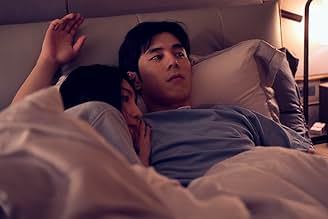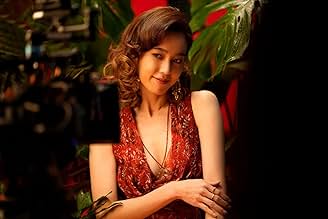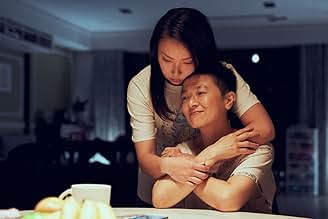Nothing can hurt the friendship between Hsueh Ya-chi and Chou Fan, until Ya-chi decides to marry Li Tzu-chi. The unexpected marriage drives a rift between the two actresses, who become rival... Read allNothing can hurt the friendship between Hsueh Ya-chi and Chou Fan, until Ya-chi decides to marry Li Tzu-chi. The unexpected marriage drives a rift between the two actresses, who become rivals and a source of fodder for the press.Nothing can hurt the friendship between Hsueh Ya-chi and Chou Fan, until Ya-chi decides to marry Li Tzu-chi. The unexpected marriage drives a rift between the two actresses, who become rivals and a source of fodder for the press.
Browse episodes
Featured reviews
If you compare it to other Taiwanese shows, I guess this one is pretty good in terms of scriptwriting-probably the best they can achieve. However, compared to Netflix shows, which operate on a global level, it's a joke, especially in terms of acting. I watched a summary of the show, which led me to give it a try, but I couldn't even get through the first 3 minutes. The acting is way too exaggerated, and if this is the standard for actors in Taiwan, I'm honestly not surprised. While people in Taiwan praise this show a lot, it makes me wonder if they are simply blindsided by the production due to societal and political correctness or expectations. It feels like low expectations lead to high satisfaction-perhaps even an overly unrealistic level of satisfaction.
Fame is fickle. One day, you're basking in the glow of adoration; the next, you're scrolling through social media, wondering why your name is trending for all the wrong reasons. Born for the Spotlight dives into this brutal reality, exploring the fragility of success, the intoxicating lure of ambition, and the tangled relationships that come with chasing the limelight. It's a world where loyalty is conditional, talent is secondary to image, and the most dangerous thing you can do is believe your own hype. But does the show succeed in making these themes resonate, or does it get lost in its own theatrics?
Let's get the big issue out of the way first: the first couple of episodes are simply too busy, like being dropped into the eye of a hurricane. Scenes rush past in a frantic blur, with characters darting from one moment to the next, barely pausing long enough for the audience to catch its breath. It's disorienting, even exhausting. Plot threads tangle into each other without a clear focal point, making it hard to latch onto the story or its characters. I found myself increasingly bewildered, unsure of where the show was going or what it even wanted to be. As a Taiwanese native and longtime resident of the U. S., I'm familiar with both the deliberate pacing of Taiwanese dramas and the snappier storytelling of Western television, but even I struggled to keep up with the relentless exposition. Frustrated, I gave up. It wasn't until my wife nagged me into finishing the series with her that I reluctantly pressed play again. And thank goodness for marital persistence, because once the show finds its footing, it transforms into a gripping, deliciously messy spectacle.
At the heart of this high-heeled gladiatorial battle is the deliciously dysfunctional relationship between two former best friends: the once-reigning ice queen of the silver screen, Chou Fan, and the ambitious producer Hsueh Ya-chih, played by Hsieh Ying-Xuan, whose performance adds an emotional weight that keeps the drama grounded. Hsieh brings a sharp intensity to Ya-Chih, capturing her ambition, regret, and unspoken resentment in a way that makes her both formidable and deeply human. While her acting is strong, it's the plot that ultimately keeps the audience hooked-an intricate web of power struggles, betrayals, and personal reinventions that unfold with increasing tension.
For those unfamiliar with the Taiwanese entertainment industry, Born for the Spotlight offers a fascinating glimpse into its peculiarities-ones that, upon closer inspection, aren't so different from showbiz cultures around the world. The obsession with youth and reinvention? Hollywood's been perfecting that for decades. The industry's unspoken rules and behind-the-scenes power struggles? Just ask anyone who's ever navigated a corporate boardroom. And the constant fear that one misstep could spell the end of a career? That's universal, whether you're a pop star or a politician. What makes the show particularly striking is the way it captures the suffocating weight of public perception, a reality that has only intensified in the age of social media. Here, stars are expected to maintain an impossible image-flawless, uncontroversial, eternally relevant-while knowing that the audience that loves them today could just as easily discard them tomorrow.
Yet, Born for the Spotlight isn't just a cautionary tale about fame's dark side. It's also a story about reinvention, resilience, and the complicated ways we measure success. The plot unfolds with a sharp sense of irony, exposing the industry's contradictions while keeping the audience invested in the characters' fates. Western audiences may see shades of their own entertainment industry reflected here, but at its core, the show speaks to something even more universal: the fear of being forgotten, the hunger for recognition, and the bittersweet realization that sometimes, the spotlight isn't all it's cracked up to be.
In the end, Born for the Spotlight is a gloriously extravagant, razor-sharp satire that both celebrates and skewers the entertainment industry. It is glamorous yet gritty, hilarious yet haunting. Most of all, it understands that behind every dazzling performance is a performer wondering if the applause will ever come again. And isn't that the most tragic, ridiculous, and relatable thing of all?
Let's get the big issue out of the way first: the first couple of episodes are simply too busy, like being dropped into the eye of a hurricane. Scenes rush past in a frantic blur, with characters darting from one moment to the next, barely pausing long enough for the audience to catch its breath. It's disorienting, even exhausting. Plot threads tangle into each other without a clear focal point, making it hard to latch onto the story or its characters. I found myself increasingly bewildered, unsure of where the show was going or what it even wanted to be. As a Taiwanese native and longtime resident of the U. S., I'm familiar with both the deliberate pacing of Taiwanese dramas and the snappier storytelling of Western television, but even I struggled to keep up with the relentless exposition. Frustrated, I gave up. It wasn't until my wife nagged me into finishing the series with her that I reluctantly pressed play again. And thank goodness for marital persistence, because once the show finds its footing, it transforms into a gripping, deliciously messy spectacle.
At the heart of this high-heeled gladiatorial battle is the deliciously dysfunctional relationship between two former best friends: the once-reigning ice queen of the silver screen, Chou Fan, and the ambitious producer Hsueh Ya-chih, played by Hsieh Ying-Xuan, whose performance adds an emotional weight that keeps the drama grounded. Hsieh brings a sharp intensity to Ya-Chih, capturing her ambition, regret, and unspoken resentment in a way that makes her both formidable and deeply human. While her acting is strong, it's the plot that ultimately keeps the audience hooked-an intricate web of power struggles, betrayals, and personal reinventions that unfold with increasing tension.
For those unfamiliar with the Taiwanese entertainment industry, Born for the Spotlight offers a fascinating glimpse into its peculiarities-ones that, upon closer inspection, aren't so different from showbiz cultures around the world. The obsession with youth and reinvention? Hollywood's been perfecting that for decades. The industry's unspoken rules and behind-the-scenes power struggles? Just ask anyone who's ever navigated a corporate boardroom. And the constant fear that one misstep could spell the end of a career? That's universal, whether you're a pop star or a politician. What makes the show particularly striking is the way it captures the suffocating weight of public perception, a reality that has only intensified in the age of social media. Here, stars are expected to maintain an impossible image-flawless, uncontroversial, eternally relevant-while knowing that the audience that loves them today could just as easily discard them tomorrow.
Yet, Born for the Spotlight isn't just a cautionary tale about fame's dark side. It's also a story about reinvention, resilience, and the complicated ways we measure success. The plot unfolds with a sharp sense of irony, exposing the industry's contradictions while keeping the audience invested in the characters' fates. Western audiences may see shades of their own entertainment industry reflected here, but at its core, the show speaks to something even more universal: the fear of being forgotten, the hunger for recognition, and the bittersweet realization that sometimes, the spotlight isn't all it's cracked up to be.
In the end, Born for the Spotlight is a gloriously extravagant, razor-sharp satire that both celebrates and skewers the entertainment industry. It is glamorous yet gritty, hilarious yet haunting. Most of all, it understands that behind every dazzling performance is a performer wondering if the applause will ever come again. And isn't that the most tragic, ridiculous, and relatable thing of all?
I loved this series from start to finish. Agreed, the acting is a bit unequal, some editing was sometimes a bit of a patchwork... but at the end it didn't matter much for me. I liked the authenticity of the story, the script is clever and sensitive.
Some themes are recurring in the plot: The difficulty of finding your place for an actress past a certain age.
How the friendship between two women can be intense but also break so easily.
How people can stay unhappy by always repeating the same behavior.
At the end, Ya-chih is perhaps the most mature character, but at which price? She rejects her closest partners (Chou Fan, and later her husband) at the first faux-pas.
At the end, who is wrong, who is right, who is happy? Give us more of this please.
Some themes are recurring in the plot: The difficulty of finding your place for an actress past a certain age.
How the friendship between two women can be intense but also break so easily.
How people can stay unhappy by always repeating the same behavior.
At the end, Ya-chih is perhaps the most mature character, but at which price? She rejects her closest partners (Chou Fan, and later her husband) at the first faux-pas.
At the end, who is wrong, who is right, who is happy? Give us more of this please.
Born for the Spotlight leads viewers into the intricate friendship between two top actresses-Hsueh Ya-chih and Chou Fan-set against the fiercely competitive and alluring backdrop of the entertainment industry. While the drama boasts stellar performances and a fair amount of emotional tension, the overall narrative falls short of expectations. Despite its wealth of potential and richly layered characters, the series bites off more than it can chew, failing to fully flesh out the unique charm of each storyline. Ultimately, the result is a plot that feels scattered and incomplete.
The core conflict in Born for the Spotlight has plenty of room for development: the friendship between Hsueh Ya-chih and Chou Fan, once inseparable, begins to fray after Hsueh's unexpected marriage, which eventually turns the two into rivals. This premise holds immense emotional depth, with the potential to explore the complexities of relationships, competition, and betrayal in the entertainment world. However, the series doesn't focus its energy on carefully crafting this pivotal relationship. Instead, it jumps between different characters and subplots, leaving the main conflict feeling underdeveloped and lacking the depth it deserves.
Take the rift between Hsueh and Chou, for instance. Their fractured friendship should have been the emotional anchor of the entire series, but the show struggles to convincingly portray the nuances of their relationship's transformation. The abrupt shift following Hsueh's marriage feels forced, and viewers are left questioning why such a life event would so drastically alter their bond. The emotional buildup is too thin, robbing the story of the impact it could have had.
Additionally, the subplot surrounding rising star Emma Shih, a young actress striving to make her mark in the industry, feels underwhelming. As a 20-year-old with big dreams, Emma's journey could have offered a compelling contrast to the established actresses, adding layers of drama and tension. Yet, her path to stardom lacks real surprises or depth, rendering her more of a passive observer rather than an integral part of the narrative.
Despite these shortcomings, Born for the Spotlight does manage to create characters brimming with charm and complexity. Hsueh, Chou, and even Emma all possess intriguing personal stories, each with their own unique allure. Hsueh's resilience, Chou's mix of vulnerability and power, and Emma's youthful ambition-these characters offer rich material that could have been deeply explored.
The performances of the actors, in particular, breathe life into these characters, adding layers of subtlety to their emotions. The on-screen chemistry between Hsueh and Chou, whether in their moments of closeness or conflict, pulls the audience into their emotional struggles. Their performances elevate the material, making up for some of the narrative's shortcomings by giving the characters a tangible sense of humanity.
However, the show's ambition to juggle multiple storylines ultimately works against it. By trying to tell too many stories at once, the series dilutes the impact of each character's arc. If the focus had been on just one or two central figures, the emotional depth and dramatic tension could have been significantly stronger. As it stands, every storyline feels only halfway realized, preventing viewers from fully engaging with the characters' journeys.
It's easy to imagine how this series could have flourished if it had been divided into multiple seasons. Each season could have focused on different characters, allowing their stories to unfold at a more natural pace. The first season, for example, might have concentrated on Hsueh and Chou's friendship, tracing the rise and fall of their bond with more nuance and detail. The second season could have explored Chou's internal battles as she navigates the ruthless industry, while a third season could have spotlighted Emma's rise, contrasting her youthful idealism with the seasoned veterans. Such an approach would have given each character the attention they deserve, creating a richer, more immersive narrative.
In the end, Born for the Spotlight is a series brimming with untapped potential. It offers a cast of characters who are each fascinating in their own right, but it spreads itself too thin by trying to tell too many stories at once. If the show had chosen to focus more intently on one or two characters, or if it had been structured across multiple seasons, it might have delivered a more powerful and cohesive viewing experience. Even so, the standout performances and the intriguing, though underdeveloped, characters are enough to provide some enjoyment for viewers looking for a glimpse into the glamorous yet cutthroat world of showbiz.
The core conflict in Born for the Spotlight has plenty of room for development: the friendship between Hsueh Ya-chih and Chou Fan, once inseparable, begins to fray after Hsueh's unexpected marriage, which eventually turns the two into rivals. This premise holds immense emotional depth, with the potential to explore the complexities of relationships, competition, and betrayal in the entertainment world. However, the series doesn't focus its energy on carefully crafting this pivotal relationship. Instead, it jumps between different characters and subplots, leaving the main conflict feeling underdeveloped and lacking the depth it deserves.
Take the rift between Hsueh and Chou, for instance. Their fractured friendship should have been the emotional anchor of the entire series, but the show struggles to convincingly portray the nuances of their relationship's transformation. The abrupt shift following Hsueh's marriage feels forced, and viewers are left questioning why such a life event would so drastically alter their bond. The emotional buildup is too thin, robbing the story of the impact it could have had.
Additionally, the subplot surrounding rising star Emma Shih, a young actress striving to make her mark in the industry, feels underwhelming. As a 20-year-old with big dreams, Emma's journey could have offered a compelling contrast to the established actresses, adding layers of drama and tension. Yet, her path to stardom lacks real surprises or depth, rendering her more of a passive observer rather than an integral part of the narrative.
Despite these shortcomings, Born for the Spotlight does manage to create characters brimming with charm and complexity. Hsueh, Chou, and even Emma all possess intriguing personal stories, each with their own unique allure. Hsueh's resilience, Chou's mix of vulnerability and power, and Emma's youthful ambition-these characters offer rich material that could have been deeply explored.
The performances of the actors, in particular, breathe life into these characters, adding layers of subtlety to their emotions. The on-screen chemistry between Hsueh and Chou, whether in their moments of closeness or conflict, pulls the audience into their emotional struggles. Their performances elevate the material, making up for some of the narrative's shortcomings by giving the characters a tangible sense of humanity.
However, the show's ambition to juggle multiple storylines ultimately works against it. By trying to tell too many stories at once, the series dilutes the impact of each character's arc. If the focus had been on just one or two central figures, the emotional depth and dramatic tension could have been significantly stronger. As it stands, every storyline feels only halfway realized, preventing viewers from fully engaging with the characters' journeys.
It's easy to imagine how this series could have flourished if it had been divided into multiple seasons. Each season could have focused on different characters, allowing their stories to unfold at a more natural pace. The first season, for example, might have concentrated on Hsueh and Chou's friendship, tracing the rise and fall of their bond with more nuance and detail. The second season could have explored Chou's internal battles as she navigates the ruthless industry, while a third season could have spotlighted Emma's rise, contrasting her youthful idealism with the seasoned veterans. Such an approach would have given each character the attention they deserve, creating a richer, more immersive narrative.
In the end, Born for the Spotlight is a series brimming with untapped potential. It offers a cast of characters who are each fascinating in their own right, but it spreads itself too thin by trying to tell too many stories at once. If the show had chosen to focus more intently on one or two characters, or if it had been structured across multiple seasons, it might have delivered a more powerful and cohesive viewing experience. Even so, the standout performances and the intriguing, though underdeveloped, characters are enough to provide some enjoyment for viewers looking for a glimpse into the glamorous yet cutthroat world of showbiz.
This isn't a tragic drama, but I found myself crying until I got a migraine. In fact, I'm typing this while battling a searing migraine. In brief, I recommend this drama.
The strongest point in this drama is how the characters are brought to life by brilliant actors. It starts out a little slow, with the introduction of the characters but later picks up pace. The plot definitely encourages curiosity in the viewer about the personalities of characters and how their plot lines may develop, and I was not disappointed. The happiness, sorrows, passion and desperation of the characters was wonderfully portrayed. There's not actually much I can add because while the story itself is not particularly riveting or extraordinary, it's just been executed very well. In fact, the romance lines flowed very naturally as well.
The strongest point in this drama is how the characters are brought to life by brilliant actors. It starts out a little slow, with the introduction of the characters but later picks up pace. The plot definitely encourages curiosity in the viewer about the personalities of characters and how their plot lines may develop, and I was not disappointed. The happiness, sorrows, passion and desperation of the characters was wonderfully portrayed. There's not actually much I can add because while the story itself is not particularly riveting or extraordinary, it's just been executed very well. In fact, the romance lines flowed very naturally as well.
Details
- Runtime1 hour
- Color
- Sound mix
Contribute to this page
Suggest an edit or add missing content



































